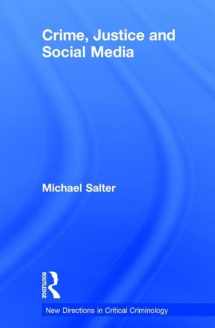
Crime, Justice and Social Media (New Directions in Critical Criminology)
ISBN-13:
9781138919662
ISBN-10:
1138919667
Edition:
1
Author:
Michael Salter
Publication date:
2016
Publisher:
Routledge
Format:
Hardcover
204 pages
FREE US shipping
Book details
ISBN-13:
9781138919662
ISBN-10:
1138919667
Edition:
1
Author:
Michael Salter
Publication date:
2016
Publisher:
Routledge
Format:
Hardcover
204 pages
Summary
Crime, Justice and Social Media (New Directions in Critical Criminology) (ISBN-13: 9781138919662 and ISBN-10: 1138919667), written by authors
Michael Salter, was published by Routledge in 2016.
With an overall rating of 3.8 stars, it's a notable title among other
books. You can easily purchase or rent Crime, Justice and Social Media (New Directions in Critical Criminology) (Hardcover) from BooksRun,
along with many other new and used
books
and textbooks.
And, if you're looking to sell your copy, our current buyback offer is $0.3.
Description
How is social media changing contemporary understandings of crime and injustice, and what contribution can it make to justice-seeking? Abuse on social media often involves betrayals of trust and invasions of privacy that range from the public circulation of intimate photographs to mass campaigns of public abuse and harassment using platforms such as Facebook, Twitter, 8chan and Reddit – forms of abuse that disproportionately target women and children. Crime, Justice and Social Media argues that online abuse is not discontinuous with established patterns of inequality but rather intersects with and amplifies them. Embedded within social media platforms are inducements to abuse and harass other users who are rarely provided with the tools to protect themselves or interrupt the abuse of others. There is a relationship between the values that shape the technological design and administration of social media, and those that inform the use of abuse and harassment to exclude and marginalise diverse participants in public life. Drawing on original qualitative research, this book is essential reading for students and scholars in the fields of cyber-crime, media and crime, cultural criminology, and gender and crime.


We would LOVE it if you could help us and other readers by reviewing the book
Book review

Congratulations! We have received your book review.
{user}
{createdAt}
by {truncated_author}


